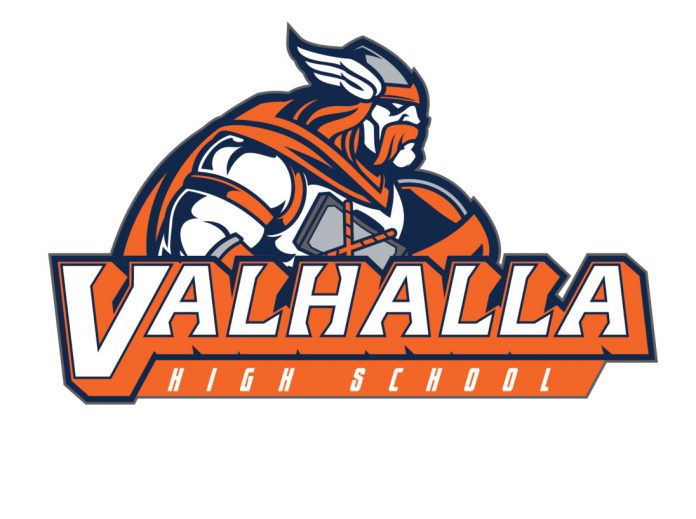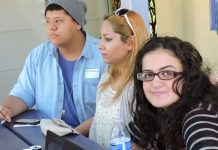There is a new consumer math teacher in town, and she is shaking things up.
Sarah Ritter, 25, has been teaching consumer math at Valhalla High School for three years and this year she decided it was time to take things to the next level.
Ritter said the program at Valhalla uses the Dave Ramsey curriculum and, while it is a good program, it was a little outdated.
“The materials were awesome but they were older, like ten years old,” said Ritter. “They were using examples from 2006.”
There is a new consumer math teacher in town, and she is shaking things up.
Sarah Ritter, 25, has been teaching consumer math at Valhalla High School for three years and this year she decided it was time to take things to the next level.
Ritter said the program at Valhalla uses the Dave Ramsey curriculum and, while it is a good program, it was a little outdated.
“The materials were awesome but they were older, like ten years old,” said Ritter. “They were using examples from 2006.”
Consumer math, which teaches high school students about real-world financial issues in a practical sense, is an important subject for high schoolers, Ritter said, so she reached out to the Dave Ramsey Foundation and let them know her school needed support.
“I would say that personal finance is a need across the board, but specifically in East County I would say, certainly,” she said. “The younger we can help our students learn about this the better. We want students who can manage their finances and are prepared for adulthood. Our special education department can’t fund a whole new curriculum, so the gal I was talking with at Dave Ramsey helped me set up for a sponsorship to get a new curriculum.”
The Jackson Charitable Foundation picked up the request for a sponsor and provided Ritter with updated workbooks. These workbooks the students can take home with them after the year is done to keep as references to all the information they are learning in high school once they are out in the real world.
Ritter said she has integrated the new Dave Ramsey books into her regular lessons to supplement the concepts they are learning.
“They go through pieces of personal finances for students and there are chapters for each one,” she said. “Because my class is technically a math class, we have the consumer math textbook that goes through all the technical bits, but then we do a chapter from the Dave Ramsey as well.”
The curriculum covers money management skills, budgeting, living within one’s means and creating good financial habits, among other things.
“It’s pretty interesting because at first students were like ‘I don’t know,’ because they don’t think it’s going to be applicable to them,” said Ritter. “But then we start talking about having a savings account with $500 or how to save for a car…they can see how it’s applicable. I love the math program because they need the math credits, but the Dave Ramsey program is so much more focused on them and what they need to learn.”
Ritter said the curriculum, “Foundations in Personal Finance,” has been hugely successful with her students over the last few years.
“At first they were hesitant and now they come in and are like ‘oh, we’re doing Dave Ramsey today!’” she said. “I’ve had students who have come back from the past two years and they’re in the real world now and they say, ‘I remember that Dave Ramsey said, don’t do credit cards! Don’t get into debt!’ They appreciate it as they see it apply to their lives.”
Alyssa Hall, a Valhalla alumna and a former student of Ritter’s consumer math class, said the Dave Ramsey program was personally beneficial to her.
“Dave Ramsey helped me with my money and finance by breaking down each part of paying for a house or buying or car and even taxes,” said Hall. “It better prepared me for my future my showing stories of how people got into debt and were trying to get out of it for years. Dave Ramsey opened my eyes to the whole other world of bills and taxes and without Dave Ramsey I would’ve probably gotten myself into some debt.”
Barbara Ozenbaugh has taken Dave Ramsey’s “Financial Peace” as an adult and said she would love to have had it as a high schooler. Ozenbaugh is now a parent of a Norseman who is taking Ritter’s course and she could not be happier about it.
“One of the life skills that is critical for young people is financial management of their own money,” she said. “It teaches the importance of saving money, investing wisely, and how to make a household monthly budget. Ramsey also stresses the dangers of credit cards, and the importance of giving to charity. All of these skills I have tried to pass on to my son Matt, and I love the fact that these ideas are being reinforced in the classroom.”
Ozenbaugh said she thinks consumer math should be required for all high school students.
“If we can teach them how to create a solid financial future before they get out into the working world, that does nothing but set our students up for success,” she said.
Ritter said her own experiences have reaffirmed that this is a crucial topic for everyone to learn about.
“I can’t say it enough that I feel personal finance and financial literacy is so important,” she said. “I’m 25 and my generation and the older generations haven’t taken it as seriously and I’m so grateful to my school that allows me to teach this kind of curriculum. This class is the most important class that they’re going to take in hs because it’s the one that’s going to apply the most to their future.”
Ritter said that financial stability affects more than just credit or opportunities. Divorce and other family issues often spring from unhealthy relationships with money.
Abel Mercado, a former Norseman and pupil of Ritter, said the program showed him how to save and spend his money and open a bank account. But, Mercado said, the best part of the class was the support system built in by Ritter and his classmates.
“What really helped me was my environment, like having the best teacher in the whole school teach me a subject I’m not so good at,” he said. “Not only did the teacher help us, but the students helped each other out when we didn’t understand something. There was never no [sic] judgements in that class. Everyone was free to express themselves… that class was filled nothing but love, friendship, hard work and positive energy.”














